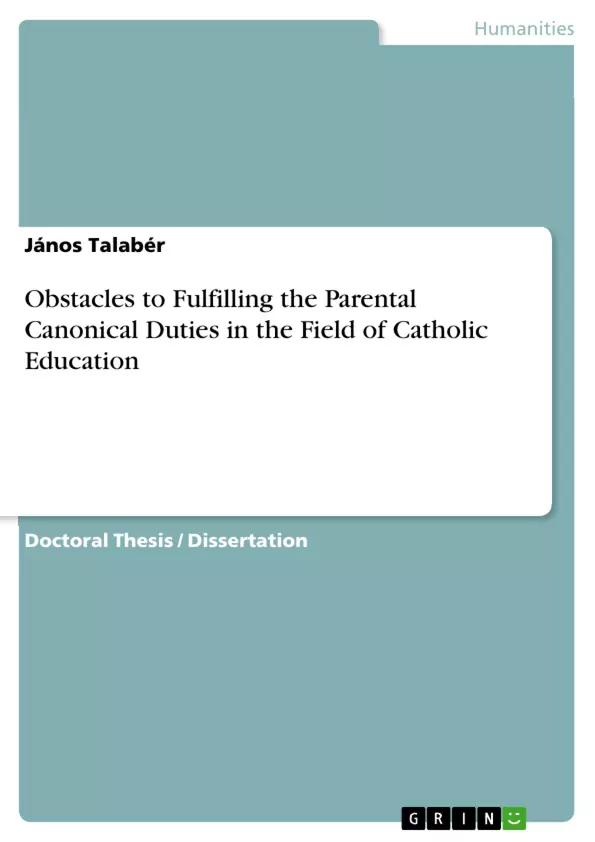Many would consider Codex Iuris Canonici to be the best choice of triggering out a new, acceptable, modern legislation in the Catholic Church1, the origin source of maintaining the unique spells of Christ, of which faithful had to be given an up-to-date book of church disciplinae. However, in many fields the duties and rights are somehow violated, even do obstacles lie in front of them. The intent purpose of this essay, therefore, is to deal with obstacles lying before the acceptable fulfillment of duties of the christian believers in the field of catholic education. When our dealing with the topic of catholic education, canons 793-821 are put into view. We would not, however, state that all duties are violated, and that the purpose of the editors of the code has not reached its aims. Our wish is to highlight those fields in the civil legislations where, practically proved, there are some significant obstacles preventing the faithful from giving the most proper education to their offspring. Thus, we cannot apart from drawing the historical as well as legal backgrounds to make out obvious and provable evidences.
(c) Talabér János doktori értekezés, Doctoral Essay: ABSTRACT (c)
Inhaltsverzeichnis (Table of Contents)
- Introduction
- Chapter One
- Definitions
- Participants in Education
- Mission and Preaching and their impacts on education
- Chapter Two
- Historical roots of education
- The demanding role of the diocesan bishops in education
- The border line and the norm since Vaticanum
- Conciliar work and codification
- Chapter Three
- The essence of the Christian marriage
- Parental status in divorce, cohabitation and re-marriage
- Chapter Four
- The duties of parents according to the present law
- Chapter Five
- The rights of the Church in education, civil attitudes
- Chapter Six
- Obstacles to fulfilling the parental duties
- Impediments and obstacles in canon law
- Special impediments
- Introduction to the term obstacles
- Environmental Obstacles
- Juridical Obstacles
- Obstacles of capability
Zielsetzung und Themenschwerpunkte (Objectives and Key Themes)
This doctoral essay aims to examine the obstacles hindering the fulfillment of parental canonical duties within the context of Catholic education. It analyzes the legal and historical frameworks governing parental roles in education, focusing on areas where civil legislation creates practical challenges for parents in providing a Catholic education for their children.
- Canonical duties of parents in Catholic education
- Historical and legal background of Catholic education
- The impact of civil legislation on parental rights and duties
- Identification of impediments and obstacles to fulfilling parental duties
- Analysis of specific obstacles (environmental, juridical, and capability-based)
Zusammenfassung der Kapitel (Chapter Summaries)
Chapter One defines key terms related to education and teaching, establishing the Church's historical model and highlighting the Second Vatican Council's significance in shaping current legislation. It also defines parental status and duties. Chapter Two explores the historical roots of Catholic education, the role of diocesan bishops, and the development of conciliar work and codification. Chapter Three discusses the essence of Christian marriage and parental roles within the contexts of divorce, cohabitation, and remarriage. Chapter Four details the duties of parents according to current canon law. Chapter Five examines the rights of the Church in education and the influence of civil attitudes. Chapter Six (partially) analyzes impediments and obstacles to fulfilling parental canonical duties, categorizing them into environmental, juridical, and capability-based challenges.
Schlüsselwörter (Keywords)
Catholic education, Canon Law, parental duties, civil legislation, impediments, obstacles, Vatican II, Christian marriage, diocesan bishops, historical context.
- Citation du texte
- János Talabér (Auteur), 2002, Obstacles to Fulfilling the Parental Canonical Duties in the Field of Catholic Education, Munich, GRIN Verlag, https://www.grin.com/document/123083



